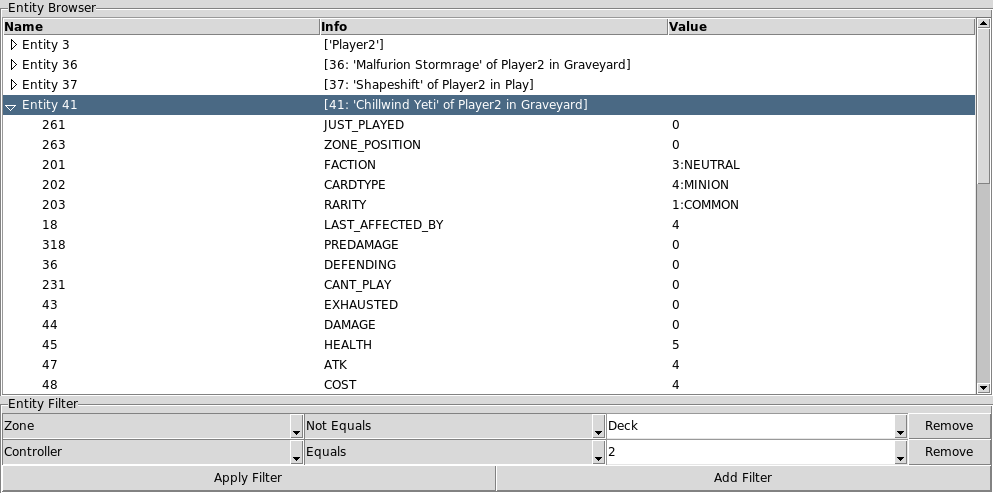Hearthy
Hearthy is a decoder for the network protocol used by Hearthstone. This project is still in early stages of development. Only the game protocol has been implemented so far.
UI
Some basic UI tools for exploring protocol dumps are provided.


The ui tools work on capture files generated by helper/hcapture.c. You can invoke the ui using the hearthy.ui.tkmain module:
python3 -m hearthy.ui.tkmain <capturefile>This also works on live captures if you use a pipe, i.e.:
tail -c+0 -f <capturefile> | python3 -m hearthy.ui.tkmain /dev/stdinSupported Packets
The following packets are currently supported: Note: S->C means the server sends it to the client
| Packet Name | Dir | Description |
|---|---|---|
| PowerHistory | S>C | State changes |
| UserUI | Bi | UI actions |
| TurnTimer | S>C | Seconds left in turn |
| GetGameState | C>S | Game state query |
| StartGameState | S>C | Game/Player info |
| FinishGameState | S>C | Sent after StatGameState |
| GameSetup | S>C | Game Board and Rules |
| GameCancelled | S>C | Game has been cancelled |
| EntityChoice | S>C | Used during mulligan |
| ChooseEntities | C>S | Response to EntityChoice |
| AllOptions | S>S | List of possible client actions |
| ChooseOption | C>S | Response to AllOptions |
| BeginPlaying | S>C | Playing mode |
| AuroraHandshake | C>S | Identification |
| GameStarting | S>C | Sent after login |
| PreLoad | ??? | ??? |
| PreCast | ??? | ??? |
| Notification | ??? | ??? |
| NAckOption | ??? | ??? |
| GiveUp | ??? | Concede? |
| DebugMessage | ??? | ??? |
| ClientPacket | ??? | ??? |
For detailed contents of the packets see protocol.mtypes.
Example Usage
The usual usage of this package is to use the protocol.utils.Splitter class to split a network stream into packets followed by protocol.decoder.decode_packet to decode the packets.
from hearthy.protocol.utils import Splitter
from hearthy.protocol.decoder import decode_packet
from hearthy.protocol import mtypes
s = Splitter()
while True:
buf = network_stream.read(BUFSIZE)
for message_type, buf in s.feed(buf):
decoded = decode_packet(message_type, buf)
# do something with the decoded packet
# test which packet it is using
# e.g. isinstance(decoded, mtypes.AuroraHandShake)Network Capture
A tool to automatically record tcp streams has been included in helper/hcapture.c. It uses libnids which uses libpcap to capture network traffic and performs tcp defragmentation and reassembly. The tool looks for tcp connections on port 1119 and saves them to a file. Only linux is currently supported - patches are welcome.
To compile:
gcc hcapture.c -Wall -lnids -o captureUsage:
./capture -i mynetworkiface outfile.hcapngPython code to decode the capture file is provided in datasource/hcapng.py.
Example
Reads a hcapture capture file and splits the network streams into packets.
import sys
from datetime import datetime
from hearthy.datasource import hcapng
from hearthy import exceptions
class Connection:
def __init__(self):
self._s = [Splitter(), Splitter()]
def feed(self, who, buf):
for atype, buf in self._s[who].feed(buf):
# decode and handle packet
d = {}
with open(filename, 'rb') as f:
gen = hcapng.parse(f)
header = next(gen)
print('Recording started at {0}'.format(
datetime.fromtimestamp(header.ts).strftime('%Y.%m.%d %H:%M:%S')))
for ts, event in gen:
if isinstance(event, hcapng.EvClose):
if event.stream_id in d:
del d[event.stream_id]
elif isinstance(event, hcapng.EvData):
if event.stream_id in d:
try:
d[event.stream_id].feed(event.who, event.data)
except exceptions.BufferFullException:
# Usually means that the tcp stream wasn't a game session.
del d[event.stream_id]
elif isinstance(event, hcapng.EvNewConnection):
d[event.stream_id] = Connection()